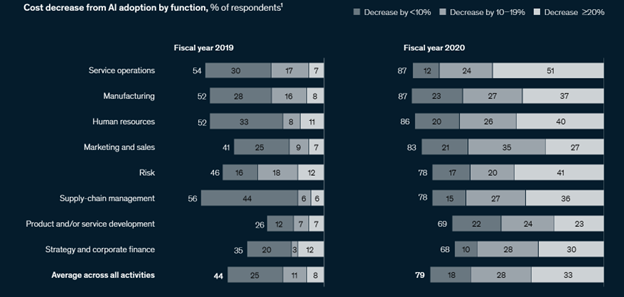
A broad overview on the development and returns of AI deployment
From self-driving Teslas to assistants like Siri, AI has taken the world by storm. Artificial Intelligence, also known as AI, is a broad field that encompasses Machine Learning, Neural Networks, Robotics, Expert Systems, Speech Processing, Natural Language Processing, and more. AI is all around us, from more subtle touches such as autocorrect and advertising, to more direct representations such as Boston Dynamics’ famous robots and voice assistants such as Siri and Amazon. AI has developed from a cutting-edge field into a more mature aspect of businesses, helping streamline mundane tasks while improving the efficiency and accuracy of the work performed. However, the question can be asked, is AI something my company should be considering, and how effective is the implementation of AI in helping a company succeed?
In this blog, the results of multiple surveys will be analyzed to address the above questions, with a focus on the adoption of AI in the workforce, benefits of AI on company revenue, and limitations in adoption of AI.
To put hard numbers on the expansion of AI, multiple surveys were conducted regarding AI integration in business. According to the Data and AI Leadership Executive Survey from 2022, over 91 percent of companies are investing in some sort of AI initiative the same percentage reported an increase in Data and AI investment over the past four years. These changes are reflected in production software as well, with an increase of 11.4 percent of companies implementing AI in widespread production, reaching 26 percent in 2022.
In another survey by IBM, Global AI Adoption Index 2021, over 31 percent of companies have deployed AI in some capacity. This indicates a prolonged interest in the development of AI, with major companies investing in technologies in the field. Many companies are also choosing to create leadership roles specifically for Data Management and AI development, such as the CDAO/CDO, up from 12 percent in 2012 to almost 73.7% in 2022. These trends indicate a growing interest in advancing the development and deployment of such technologies.
So how effective are the AI implementations? It’s a mixed bag. Economically, it appears to be a success, with respondents to the 2021 McKinsey global survey on AI indicating most companies have seen a cost decrease with AI deployment. Service Operations sectors had the highest rate of success at 87 percent of companies saving at least 10% on overall costs.
However, this is somewhat offset by the cost of AI development. According to the Deloitte State of AI in the Enterprise survey, 28% of companies surveyed reported high outcomes with high AI deployment. This is challenged by 17% of companies reporting that they achieved poor results with high AI deployment. So while most companies report at least some savings, it can be offset by the cost of developing the AI software, with a few companies drastically cutting expenses.
Non-monetary benefits of using AI were also reported, with the largest one being that time was given back to working professionals to be better spent on other activities.
So, what were some of the reasons for some companies finding success in AI deployment while others finding limited returns?
The McKinsey study indicates companies that find financial success with AI put in more effort in development and testing of their systems. Companies finding success had greater emphasis on all forms of development, including using design thinking when developing tools, testing capabilities, and having structures in place to define AI personality. The only outliers for successful companies compared to other respondents come in the form of having protocols in place to ensure good data quality. The Deloitte survey mentioned companies that significantly changed their workflow to accommodate for AI integration, and added new roles were almost 1.5 times as likely to achieve success compared to companies that did not make workflow adjustments. The survey also indicated that organizations that document and enforce MLOps processes were nearly twice as likely to achieve their AI goals compared to companies that did not.
Despite successes, there are still many obstacles in the implementation of AI. A 2019 MIT Sloan Management Review and Boston Consulting Group AI survey indicated that issues acquiring talent led to a block in the development of advanced AI models. From the Big Data Executive Survey, the largest issue appeared to be Cultural Factors, which includes business processes, business organization, or social impediments, with almost 92 percent of respondents stating this was an issue. IBM’s survey found that the top three barriers to AI adoption included limited AI expertise, increasing data complexity, and lack of tools or programs to develop AI models. Company size was a factor in the response given to barriers of AI implementation, with smaller companies mentioning that lack of data access affected the development of AI models, while larger companies struggled with integration of AI into current business practices. IBM indicated that for companies around the world, cost was the greatest barrier to adopting NLP (a subset of AI development) technology. Cultural factors also seem to influence adoption of AI, with the IBM Global AI Adoption survey indicating that Chinese companies are betting heavily on AI adoption with 92 percent of companies either using or planning to use AI in the next 12 months, while the UK sits at the lowest with 68% of companies either using or planning to use AI in the next 12 months. These reports indicate a widespread adoption of AI in the workforce, that is unlikely to subside in the foreseeable future. And with the Deloitte survey indicating that 68% of companies believing that AI is critical for future success, viewpoint seems to be that AI is becoming more of a necessity than a luxury.
If you’re interested in learning more about our take on AI, how we’re using it in our own products, and how it might be able to improve your workflows, please reach out.





